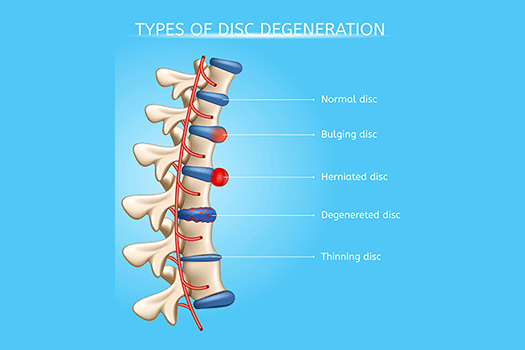
The human spine consists of 24 vertebrae along with accompanying soft, spongy discs for added cushion and support. Any abnormality affecting any of these discs has the potential to be a source of discomfort or pain, especially lower back pain. Two of the most common spinal disc problems are bulging and herniation. This article discusses which one may be considered worse and what can be done about these two disc-related issues.
Structurally, Herniation Is Worse
A "bulging" disc is swollen or protruding to one side without inner disc material coming out of the shell from the inside. When a disc is "herniated," the inner material pushes out through a crack or tear. Both of these abnormalities have the potential to irritate or compress nearby nerves. Therefore, if you go solely by what happens when a disc is bulging or herniated, herniation is worse.
But Symptoms Can Be Similar
With symptoms, there's no clear answer to the “What's worse?” question. In fact, symptoms experienced with a herniated disc can be very similar to those when a disc is bulging and also disturbing an adjacent nerve. Overlapping symptoms for herniated and bulging discs could include:
• Pain and/or back stiffness
• Numbness and tingling sensations
• Muscle weakness within the affected area
• Discomfort extending to nearby locations, such as the legs, thighs, or feet
Inflammation Can Be Worse with Herniation
Another reason herniation could be worse is because of what the protruding disc material does once it's exposed. Oftentimes, the exposed disc material is perceived as a threat by the immune system, which could trigger an inflammatory response. The resulting tissue swelling may worsen nerve irritation and, in turn, exacerbate your discomfort. With a bulging disc, on the other hand, this extra source of nerve pain isn't an issue.
Fragments of Inner Disc Material May Also Make Herniation Worse
While this doesn't always happen, it's possible for the disc material sticking out from a herniated disc to break off. Should this occur, it could get lodged within the spinal canal and become another potential source of nerve irritation.
Everyone Has a Different Experience with Disc Issues
With any type of spine or disc issue, the pain experienced is subjective based on the nature and extent of your symptoms. In other words, someone with a bulging disc could have more discomfort than someone with a herniated disc that is not significantly affecting nerves. Ultimately, the pain can be different based on many patient-specific factors.
Nonsurgical Remedies Are Often Helpful
Any unusual or recurring discomfort involving the spine or its discs should be reason enough to see a doctor or specialist. Doing so gives you a diagnosis so treatment can be recommended. The good news with both bulging and herniated discs is that remedies such as physical therapy, medication, and nonsurgical decompression are often beneficial. However, surgery may be recommended if initial treatment efforts aren’t effective after several months.
If you have a herniated disc that doesn’t respond to conservative care, a discectomy (or a less invasive microdiscectomy) may be the best option. Although this is generally a very successful procedure, having a large hole in the outer ring of the disc more than doubles the risk of needing another operation. A new treatment, Barricaid, is a bone-anchored device that closes this hole, and 95 percent of Barricaid patients in a large study didn’t undergo a reoperation due to reherniation in a 2-year study timeframe. This treatment is done immediately following the discectomy—during the same operation—and doesn’t require any additional incisions or time in the hospital.
If you have any questions about the Barricaid treatment, ask your doctor or contact us at 844-288-7474.
For full benefit/risk information, please visit: https://www.barricaid.com/instructions.


Comments